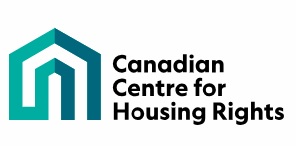
The Canadian Centre for Housing Rights (CCHR) is Canada’s leading non-profit organization working to advance the right to housing. For the first 35 years of our existence – from 1987 until 2022 – CCHR was called the Centre for Equality Rights in Accommodation (CERA).
The Canadian Centre for Housing Rights is an organization that promotes human rights in housing. CCHR works to remove the barriers that keep disadvantaged individuals and families from accessing and retaining the housing they need.
CCHR’s core programs focus on casework and test case litigation; women; eviction prevention; ESCR – economic, social and cultural rights education; and public education and research.
Our story
Every year, we provide much needed supports to hundreds of renters facing eviction and human rights issues in their housing. We also provide education on housing law, human rights and eviction prevention to a variety of audiences, including vulnerable renters, housing providers and service providers.
As we continue to serve clients to help them stay housed and educate housing providers about their responsibilities, we are also compiling research and data to ignite public action and encourage decision makers at municipal, provincial and national levels to implement the right to housing for all. This work includes engaging in law reform as a means to advance rights-based housing policy where traditional avenues of policy advocacy may not be effective.
About our research program
One key element of CCHR’s mandate is to undertake innovative research to inform the development and implementation of evidence-based policies that promote housing security for everyone living in Canada. Our research, along with all work undertaken across the organization, is guided and shaped by the seven right to housing elements: accessibility, affordability, adequacy, habitability, security of tenure, location (near services and infrastructure), and cultural adequacy.
Annual reports
Our 2023 Annual Report provides an overview of the impacts of our work at the Canadian Centre for Housing Rights (CCHR).
Executive summary
Every year, the Canadian Centre for Housing Rights (CCHR) receives hundreds of calls from newcomers who report experiencing discrimination and other barriers to accessing rental housing. Often, newcomers tell us they can find an apartment to rent, but all too often their applications are denied based on their immigration status, racial or ethnic background, the composition of their family, or because they receive social assistance. Sometimes, housing providers do not say why they are refusing to rent to them, even when they can afford the unit and can provide all the information landlords are legally permitted to request.
CCHR’s 2009 report entitled, “Sorry, it’s rented.” Measuring Discrimination in Toronto’s Rental Housing Market (“2009 discrimination audit”), has been and continues to be widely cited. In recent years, as CCHR continued to hear about the challenges that newcomers face during their settlement journeys, the need to employ a similar research model to examine the experiences of newcomers in the rental housing market today became evident.
In early 2022, a diverse team of CCHR staff, research assistants and volunteers undertook an audit which found discrimination is a barrier for racialized newcomers seeking rental housing in Toronto. To gauge the scope of discriminatory practices taking place during housing searches, the team employed a popular research method often referred to as paired testing, also known as a discrimination audit. Paired testing is a method that matches two individuals for all relevant characteristics (e.g., income level, gender identity, marital status, etc.) with the exception of one characteristic or a combination of characteristics for which discrimination is to be assessed. The audit CCHR undertook involved conducting 1,370 paired tests in Toronto via telephone and email. As a result of carrying out the audit, we found that racialized newcomers to Toronto face a high degree of discrimination in the rental housing market. This was further confirmed by a survey and interviews in which newcomers shared the myriad challenges they experienced trying to access housing in Toronto’s rental sector.
Summary of Findings
In conducting this research, CCHR found that:
• For both men and women, disclosing newcomer status elicited some form of discrimination.
• When telephone auditors appeared to be (“presented” as) from a member of a racial minority group, this compounded the discriminatory treatment they faced when disclosing their newcomer status.
• Female telephone auditors who disclosed a newcomer status faced a 62% increase in discrimination when they had accents that presented as racialized compared with female newcomer auditors who did not have racialized accents.
• Male telephone auditors who disclosed a newcomer status faced a 267% increase in discrimination when they had accents presented as racialized, compared with male newcomer auditors who did not have racialized accents.
• In the telephone audit, we found racialized newcomer women faced a 563% increase in discriminatory treatment when they disclosed that they were caring for a child, compared with when parental status was not disclosed.
• In the email audits, auditors who disclosed newcomer status with names that presented as female faced a 30% increase in discrimination when their name was also presented as racialized, compared with their non-racialized counterparts.
• In many interactions, after a telephone auditor or email auditor disclosed their newcomer status, housing providers outlined stringent criteria they had to meet to rent the unit in question. By outlining such stringent criteria, housing providers were able to deny housing to newcomers to Canada while not necessarily engaging in conduct the Ontario Human Rights Code would classify as discriminatory.
CCHR also conducted a written survey to complement the research done through the paired audits. CCHR staff sent links to the survey through the organization’s digital communications as well as through direct outreach with organizations serving newcomers in the city. We received responses from 74 people who generously shared their experiences searching and applying for housing as a newcomer in Toronto. In that survey:
• Respondents reported experiencing a high degree of discrimination by housing providers and many barriers to accessing housing in Toronto.
• 60% of respondents had been successful in securing housing since their arrival in Canada. This figure alludes to the steep and various barriers that newcomers face in securing housing upon arrival in Canada.
• Of the respondents who had been unable to secure housing on arrival in Canada, all reported a racial identity other than non-racialized, suggesting racialized identities faced heightened barriers to newcomers accessing housing in Toronto.
• Of the 40% of respondents who had been unable to secure housing since arriving in Toronto, 85% were earning less than $2,000 per month (before tax), with 61% earning less than $1,000 per month. A further 62% of respondents who had been unable to secure housing received social assistance.
In addition to the audit and the survey, CCHR’s research team conducted semistructured interviews with 10 newcomers, to further contextualize the other data. The interviewees all reported challenges in accessing housing:
• The newcomers spoke to a range of different experiences and shared the profound difficulties they faced as they endeavored to secure housing upon first arriving in Toronto.
• The most significant barriers they cited included: affordability, race-based discrimination, gender-based discrimination, discrimination based on familial structure or the presence of a child (in particular being a single-parent family), discrimination based on the receipt of social assistance, and a lack of familiarity with Toronto and the norms associated with finding housing.
• Many interviewees noted that not having a credit history in Canada often precluded them from applying to housing units.
• Interviewees often outlined an initial sense of confusion about how and where to seek housing in Toronto, and cited this as a key impediment to securing housing upon arrival.
• All 10 interviewees disclosed that being unable to access housing created significant challenges in other areas of their lives.
Overall, our research indicates that newcomers to Toronto face a concerning degree of discrimination and that the experiences we were able to capture may only represent a fraction of the overall discrimination taking place. With the supply of affordable rental housing in Toronto already severely limited and quite costly relative to median newcomer incomes and financial resources, our research demonstrates that even where housing might be available, heightened barriers to accessing it are being created by discriminatory treatment toward racialized newcomers to Toronto. This leaves countless new residents unable to access adequate housing to start positive settlement journeys in Canada.
The experiences of discrimination described in this report are damaging and have negative impacts on the ability of individuals and families to thrive in Canada. It is important that discrimination in housing against newcomers and members of equity-deserving groups is foregrounded in public conversations and that action is taken on the individual as well as at the policy level to prevent and address it.
Thank you for taking the time to inform yourself about one aspect of discriminatory treatment in housing. Learn more about Canadian Centre for Housing Rights (CCHR) and access a copy of their annual report by clicking on this link.

